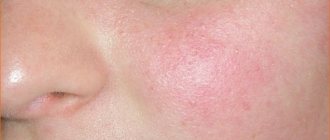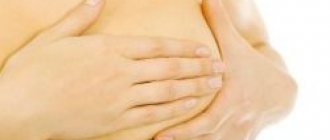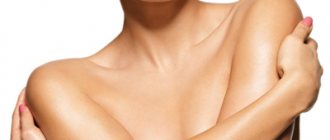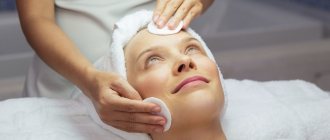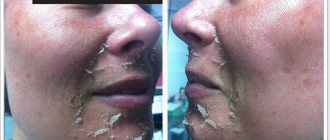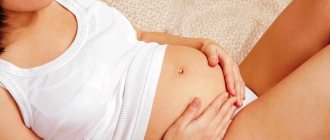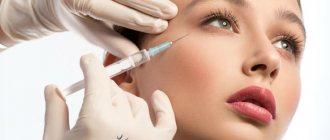Peeling skin during pregnancy: reasons
During a wonderful time of pregnancy for every woman, the expectant mother undergoes a serious restructuring of her body. It adapts as much as possible to the needs of the growing baby, and in the last trimester prepares for childbirth. A pregnant woman experiences external and internal changes.
And pregnancy also means, one way or another, stress, poor health, and fatigue. And all these factors affect the condition of the skin not in the best way.
Why does skin peel during pregnancy?
- Natural need for water
- Physical changes
- Lack of vitamins and microelements
- Stress
- Improper care
- Hormonal changes
Expectant mothers need to take into account that the volume of liquid consumed now goes not only to her needs, but also to the needs of the baby. From the second trimester, amniotic fluid will begin to form, and the lack of water in the body can become noticeable and manifest itself, among other things, as the problem of flaky skin.
When a pregnant woman’s figure begins to change, her breasts enlarge, her hips expand, her belly with the baby inside grows, and her skin stretches. This process may be accompanied by itching and flaking of the skin of the abdomen. During pregnancy, breasts often peel off due to secretions and colostrum released from the nipples.
The expectant mother should carefully monitor her diet and eat enough nutrients for the health of her unborn child. Vitamin deficiency, especially a lack of vitamins A, E, B, leads to dryness of the epidermis and is manifested by peeling of the skin of the face, hands and feet during pregnancy.
It's normal to feel anxious during pregnancy. But not in the case when stress is accompanied not only by psychological discomfort, but also by physical manifestations. When stressed during pregnancy, the skin on the arms and legs peels and severe itching occurs.
Insufficient hygiene, especially if pregnancy occurs in a hot climate and during the warm season, leads to skin irritation, dryness, and flaking.
As a result of changes in hormonal levels, the secretion of sebum, which is necessary for sufficient hydration of the skin, is disrupted. If the epidermis is excessively dry, peeling of the skin may begin.
Sometimes unwanted hormonal changes occur against the background of disturbances in the functioning of internal organs and systems. Pregnant women may experience abnormalities in the functioning of the endocrine system, which lead to a decrease in estrogen levels (this hormone, among other things, is responsible for the good condition of the skin). With hypothyroidism, the thyroid gland begins to produce less hormones, which is also reflected in the form of peeling and itching of the skin. Lack of prolactin (the hormone plays an important role during lactation) is manifested by increased sweating, which often causes itching and peeling of the skin of the abdomen and body during pregnancy. Also, a large group of causes of skin peeling are specific dermatoses of pregnant women, manifested by itching, rashes, dryness and flaking of the skin.
Prevention of gland diseases
If the skin begins to peel off severely and peel around or near the nipples, then prevention and treatment will mainly depend on the factors that influenced the development of the disease.
A woman should closely monitor the health of her entire body, eat right, eat only foods enriched with vitamins and microelements , exercise regularly and continue to keep her body in good condition, avoid all kinds of stress and overwork, find time for proper sleep and rest.
If we talk about the condition of the breast, then you need to follow some recommendations from your attending physicians:
- closely monitor the level of hormones in the body;
- if necessary, you need to increase the level of minerals and nutrients in the foods you consume;
- independently monitor the condition of your breasts and undergo regular examinations;
- during pregnancy, you need to wear a special breast-supporting bra;
- apply only tested cosmetic products to this area;
- when feeding a newborn with milk, you need to learn how to apply it to the breast correctly;
- eliminate the use of various food additives and medications or at least minimize it;
- go for an examination with a gynecologist every year;
- Rinse the laundry thoroughly after washing with special chemicals;
- choose only high-quality cotton underwear that will not cause irritation to the skin.
Sensitive skin in the chest area needs proper and careful care, especially as you age. You should try your best to avoid negative effects on the breasts and carefully monitor their condition.
Peeling nipples during pregnancy
Already in the first weeks, many pregnant women notice changes in their breasts. She becomes too sensitive, the mammary glands become enlarged, and discharge from the nipples appears. And at the same time, the nipples can itch and peel. This is not a pathology, but one of the most common conditions found in pregnant women.
What causes peeling of the breasts and nipples?
- With nipple discharge
- With an allergic reaction
- With increasing breast size
Even during pregnancy, the body begins to prepare for the birth of a child and the upcoming feeding. Small white bubbles appear on the nipple halo, secreting secretions. It lubricates the nipple to protect against dryness.
Excessive secretion and insufficient hygiene lead to irritation of the breast skin, itching, and peeling.
In the last trimester, colostrum begins to be released from the mammary glands (this is especially true for women who have previously given birth and have developed thoracic ducts). The liquid dries on the breasts, resulting in a feeling of tight skin, itching, and peeling in the nipple area.
Increased skin sensitivity during pregnancy can cause allergic reactions to clothing, especially synthetic ones. On the chest, an allergy will manifest itself as itching, irritation, dryness and flaking. The same reaction can be caused by a hygiene product: shower gel or body cream.
During pregnancy, the mammary glands enlarge and in the last trimester they are filled with milk for future feeding. With breast enlargement, the skin stretches quickly and unevenly, which causes itching, dryness and flaking.
What to do if your nipples peel during pregnancy?
To eliminate unpleasant sensations, careful hygiene and care is sufficient. Breasts and nipples should be washed regularly with warm water (can be wiped with a damp towel) and wiped dry.
To prevent allergies, it is better to choose cotton underwear and change your bra size in a timely manner.
Lubricate the skin around the nipples with a hypoallergenic remedy for dry skin. La-Cri MAMA emulsion is perfect for these purposes. It not only moisturizes and softens the skin, but also effectively fights the formation of stretch marks that can appear on the breasts as a result of breast enlargement.
If peeling nipples during pregnancy are very disturbing, does not go away even with proper care, or is accompanied by other symptoms: chest pain, change in skin color, increased body temperature, purulent or bloody discharge from the nipples, general malaise - this is a reason to urgently consult a doctor.
How to get rid of it?
It will not be news that in order to eliminate dryness it is necessary to influence the cause of its occurrence. In the most common situations, breast skin requires proper care. It is worth giving up aggressive detergents and drying lotions, replacing them with delicate cleansing, softening and moisturizing products (foam, milk, creams). Homemade breast masks made from available ingredients will also help with care:
- Oatmeal, milk, honey, butter.
- Banana pulp with olive oil.
- Crushed oatmeal with grated carrots.
At the same time, it is necessary to normalize the drinking regime and the intake of vitamins from food. During breastfeeding, it is recommended to treat nipples with ointments based on medical lanolin and dexpanthenol. This helps eliminate dryness and faster healing of damage. Lotions made from decoctions of chamomile, string, lemon balm, as well as lubricating the skin with almond oil will help relieve itching during pregnancy.
By removing the allergen (underwear, cosmetics), you can eliminate the skin reaction itself, which is the effectiveness of elimination therapy. If the disease has acquired the character of neurodermatitis, then the use of antihistamines and corticosteroids will be required.
The only situation where radical correction is necessary is breast cancer. Unfortunately, in other cases the prognosis becomes disappointing. Surgical removal of the tumor is combined with radiation, hormone and chemotherapy. There are also biological drugs that act on certain receptors on cancer cells.
Experts' opinion
An important component of the emulsion is licorice extract, the anti-inflammatory activity of which has been clinically proven as part of a study of the biological activity of aqueous extracts of chamomile flowers, raspberries, licorice rhizomes and their combinations at the Bashkir State University.[1]
A clinical study of La-Cri products proves their high effectiveness, safety and tolerability for daily skin care of adults and children. The products are recommended by the Union of Pediatricians of Russia and are safe for the delicate skin of the expectant mother.
Peeling of hands during pregnancy
Dry skin occurs on the hands more often than on other parts of the body. This is due to the fact that hands are exposed to constant external influences and are often not protected from the sun and chemicals. The situation worsens during pregnancy, and the skin begins to peel off on the hands and fingers even more actively, up to the formation of cracks and wounds.
Dry hand skin requires a special product, for example, La Cree cream for dry skin, which perfectly softens and nourishes the skin, protecting it from peeling and drying out. And if your hands are already chapped, the cream will have an anti-itching effect, relieve redness and peeling.
Folk remedies
The use of folk remedies to eliminate dry skin of the nipple area is aimed at ensuring normal pH of the skin. For this use:
- moisturizing the nipple with sour cream, kefir;
- breast mask using olive, peach and grape oils in equal proportions;
- sea buckthorn oil for application to the sponge and under the pad at night on the nipple.
All traditional methods used must be previously agreed with the obstetrician; there may be contraindications.
The skin of the breast is especially sensitive and delicate, so it is in this place that dryness, redness and itching most often occur in many women of different ages. If the skin on your nipples begins to peel and itch, you should not hesitate to see a doctor. The sooner a diagnostic examination of the mammary glands is carried out, the easier it will be to overcome the problem without consequences.
Peeling skin during pregnancy: what to do
- Cleanse skin thoroughly. This is especially true for the breasts and nipples, where secretions are constantly released.
- Drink enough fluids.
- Use special products for dryness and stretch marks, which contain a minimum of chemicals.
- Eat right, take vitamins.
- Wear clothes made from natural fabrics.
It should be understood that if peeling is caused by any abnormalities in the body, eliminating only external manifestations will not be effective.
If such disorders are diagnosed by a gynecologist after a regular examination, he will refer the pregnant woman to specialized specialists. Sources:
[1] https://cyberleninka.ru/article/v/biologicheskaya-aktivnost-vodnyh-ekstraktov-tsvetkov-romashki-mali…
Sources:
- Habiff Thomas P., Clinical Dermatology. Acne-like and papulosquamous dermatoses, publishing house: MEDpress-inform, 2014
- Churolinov Petr, Herbal medicine in dermatology and cosmetics, Medicine and Physical Education Publishing House, 1979
- Schneiderman Paul, Grossman Mark, Differential diagnosis in dermatology. Atlas, Publishing house: Binom, 2017
Treatment of breast lesions
The moment a woman notices irritation in the mammary glands, she should immediately go to see her doctor. Only a specialist in this case can understand the cause and begin proper treatment of the pathology. In this case, it is not recommended to use folk remedies, as this can only negatively affect the patient’s condition.
The only thing that can be done in this case, with the permission of a physician, is to lubricate the nipples with a special chamomile decoction , if the woman is carrying a child or breastfeeding. All other treatment methods and drugs are strictly prohibited. There is no need to try to use scrubs: it is simply impossible to eliminate damage to the skin with such means; in addition, they can only provoke greater irritation.
Only a timely visit to the doctor can improve the condition. First, you should make an appointment with a gynecologist, he will conduct an initial examination and, if necessary, send you for a consultation with a dermatologist or mammologist.
Author of the article: pediatrician Valentina Razheva
